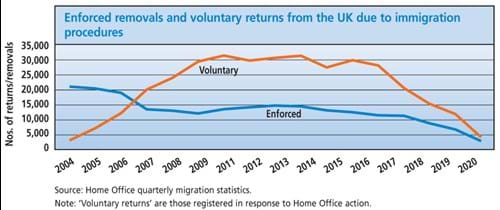25 Oct 2021
Over two million foreign nationals excluded from social housing and benefits
After the June 30 deadline for EU nationals to apply for settled status in the UK, another tranche of the population is now prevented from renting accommodation, getting homelessness help or receiving benefits. EU citizens who have not applied to the EU settlement scheme (EUSS), together with those who have arrived since the deadline, are affected. How many failed to apply is unknown but a leaked Whitehall report estimated that 130,000 EU benefit recipients had still to apply in June. In addition, around two million people who hold pre-settled status will need to reapply later, in order to confirm their residency rights and some, inevitably, will fail to do so or be rejected.
The EU citizens affected join the huge number of UK residents already ineligible for social housing, homelessness help or benefits because of Home Office ‘hostile environment’ policies. According to ministers, the purpose of the hostile environment, including ‘right to rent’ checks by landlords on prospective tenants, is to ‘stop migrants using public services to which they are not entitled, reduce the pull factors which encourage people to come to the UK and make it easier to remove people who should not be here’. However, the National Audit Office has criticised the Home Office for failing to measure the intended effects. As the chart shows, since measures such as ‘right to rent’ began in early 2016 the numbers of enforced removals have fallen, while voluntary returns have continued to fall, suggesting that in this important respect the hostile environment is failing.

Source: Home Office quarterly migration statistics. [NB will have data up to 2020]
Note: ‘Voluntary returns’ are those registered in response to Home Office action.
Those affected fall into two main groups. The first is the estimated 1.4 million people living in the UK legitimately but with ‘no recourse to public funds’ (NRPF), meaning that they can rent privately but get no help if (for example) they become unemployed. They have been particularly affected during the pandemic, as the JCWI have pointed out.
The second and even more vulnerable group is what the Migration Observatory estimates to be between 800,000 and 1.2 million people who have no legal status at all. This ‘undocumented’ part of the population has no formal access to housing or benefits; some 200,000 of them are children, many of whom were born in the UK. Although the characteristics of the undocumented population are of course not known in detail, a JCWI survey suggests that most have lived in the UK for more than five years and half for longer than a decade, the majority having entered legally when they first arrived (see Zoe Gardner’s article in the July newsletter). Many lost their status through circumstances beyond their control (e.g. marital breakdown, mental health issues). A large proportion could rectify their status if they were able to prove their entitlement and pay the very high fees required. JCWI argues for a new, simplified route to regularisation based on five years’ residence, immediate entitlement to citizenship for those born in the UK and a visa system which does not automatically reject people who make delayed applications.
John Perry is a policy advisor at the Chartered Institute of Housing. He edits the UK Housing Review and also advises on a wide range of subjects including planning, local authority finance, plus much more. John is a chartered CIH member.


